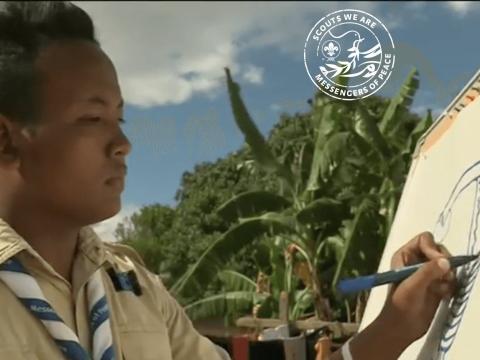Madagascar Scouts tackle a taboo

A BackStage Story by the Scout Donation Platform
Safidy is a young man tackling one of Madagascar’s biggest taboos – menstrual hygiene.
It hasn’t been easy for him to talk about the subject openly, especially as the young Scout is breaking a taboo by providing menstrual hygiene kits and training to the young girls and women of the island off the coast of eastern Africa.
In this month’s BackStage Story, Safidy tells us about his journey, the obstacles he has faced and his plans for his Scout Funding campaign.
Hi Safidy, tell us about your self
My name is Safidy Randriamitantsoa, I am 21 years old, born and raised in Madagascar. I work for UNFPA (United Nations Population Fund) in Madagascar and I'm also studying management.
I have been a Scout for 16 years. I am the National Commissioner for Development and Partnerships and National Coordinator of the Messengers of Peace programme in my NSO (National Scout Organization).
Why did you decide to break this taboo?
In several regions of Madagascar, talking about menstruation and menstrual hygiene is a taboo subject that is limited to intimate conversations between mother and daughter. Often neglected, there is very little education related to sexual and reproductive health. It is for this reason that we decided to carry out awareness projects by speaking out and providing the equipment women need.
What prompted you to take this initiative?
Some friends and I attended a training session by WaterAid, an international association that guarantees access to drinking water, sanitation, and hygiene education. That's when we realised the challenges and objectives towards breaking the silence on this topic.
It's not a secret, many women and girls today suffer from menstrual hygiene problems here. That's why we launched a project to break this taboo and raise awareness, by finally talking openly about this topic to as many people as possible.
How long have you been working on this project?
Since 2015, so it's been three years now. When the 17 Sustainable Development Goals (SDGs) in Agenda 2030 were launched, we committed to increase our efforts and promote Goal Six: "Access to clean water and sanitation".
For a project that has been running for three years, how have you managed to sustain it economically?
In the beginning, we were financing the project ourselves, but the project involves many costs - for example, one of the actions is to distribute washable sanitary napkins to women in need. We, therefore, needed help and external funding to carry out the project. It is for this reason that we decided to create a project on the Scout Donation Platform.
Why do women have difficulty getting the equipment they need to properly manage menstrual hygiene?
Madagascar is a very vulnerable country and is ranked in the ten poorest countries in the world. The main reason is that people do not have money to buy sanitary napkins or tampons.
That is why we want to distribute washable sanitary napkin kits, so people will no longer have to buy kits that are too expensive for them and that are not environmentally friendly.
As a man talking freely about such a sensitive topic what obstacles have you encountered?
I would say that we have faced two main obstacles, the first one is the lack of funds. We have many objectives and activities that we want to achieve, but we cannot do that because we do not have the funding.
The second one is the willingness of people to communicate with their families and loved ones on this topic. Menstrual hygiene and menstruation is a taboo subject in Madagascar. It is very complicated to talk about it openly. To counter this, we are producing videos and campaigns to raise awareness among the population to change their perspective and explain the need for girls and women in Madagascar to have good sexual and reproductive health.
Being a man in a project directly addressing the girls and women of Madagascar, and talking about taboo topics in our society was not always easy, and at first, people did not understand.
What are your main motivations for carrying out the project?
For the first time, men can learn and speak on this subject by speaking openly. The myths about menstruation are getting broken, families are starting to educate their daughters.
I am ready to speak, to raise awareness, to advocate in the favor of girls and women and provide them with good access to hygiene and sanitation.
What are the next goals for the project?
At the end of May, I will attend the Symposium on Menstrual Hygiene Management in East Africa and South Africa. I am invited to this event as a Scout, to share the challenges of Madagascar, our different approaches to address the subject and the solutions that we have brought to young people.
Thanks to the funds collected on the Scout Donation Platform and to the help of various partners such as UNFPA Madagascar or WaterAid Madagascar, we will pursue our efforts and do our best to continue the various projects and objectives set up. We want to develop new measures and extend our project to vulnerable areas where we did not yet have the opportunity to act.
src="https://donate-api.scout.org/api/v1/projects/3375da93-e5f7-4d79-883a-ec87cd021e10/embed">
Do you want to get more stories like this every month, straight away to your inbox? Click here to sign up to receive BackStage Stories, a monthly newsletter curated by the Scout Donation Platform team. No spamming just inspiring stories by Scouts around the globe and new projects near you.
Now it's your turn! Create a project or Donate now